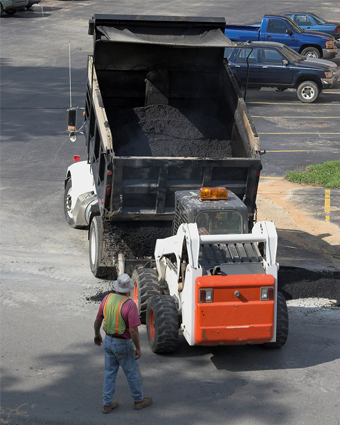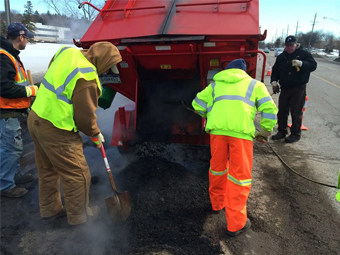 Dump trucks and asphalt hot boxes are two popular ways of repairing potholes. However, one of the methods offers far greater value and benefits than the other. Read on to learn more about asphalt hot boxes vs. dump trucks and which method can save money, reduce labor, and increase efficiency.
Dump trucks and asphalt hot boxes are two popular ways of repairing potholes. However, one of the methods offers far greater value and benefits than the other. Read on to learn more about asphalt hot boxes vs. dump trucks and which method can save money, reduce labor, and increase efficiency.
How Are Dump Trucks Used to Patch Asphalt?
When workers use a dump truck to repair potholes, they start by shoveling cold material from the truck bed onto the ground. Several inherent problems with this method ultimately lead to wasted time and money:
- Inefficiency—dump truck beds are often 55” in height or more from the ground, and this requires the workers to raise their arms high up in the air as they bring down a heavy shovel full of material.
The awkward physical motion results in bad overall ergonomics and can significantly prevent workers from achieving maximum efficiency and productivity.
Over an 8-hour day, the repetitive nature of the work coupled with the heavy asphalt material can cause severe injuries to the workers—and a potentially expensive worker’s compensation claim.
- Using cooled material—the mixture immediately starts to cool the second the workers drive away from the asphalt plant. By mid-morning, it’s already cooled and very hard to use.
The crew often find themselves having to dump the unused material and then head back to the plant to pick up another hot batch to complete the day’s work.
Using asphalt material that’s not at the optimum temperature is ineffective, wasteful, and costly. Many supervisors are well aware of this and simply shrug their shoulders—as this is the way it’s always been done.
In short, using a dump truck and cold mix to repair potholes will wind up costing more time and money than using a hot box for the same job.
How Do Asphalt Hot Boxes Work?
Diesel or propane burners fire up into the box, heating the asphalt and keeping it at an optimal temperature. It will stay this way for the remainder of the work day—and up to 72 hours overnight.
This means your work crew won’t have to make another trip back to the asphalt plant the following morning or take excess material back at the end of the day. Workers simply need to show up at the job site, and the asphalt is ready to go.
Here’s a quick demo of an asphalt hot box in use:
Benefits of an Asphalt Hot Box
Hot boxes tremendously increase the efficiency of pothole patching operations. In addition to saving money on labor and material, workers won’t break their backs shoveling asphalt as they would from a dump truck with poor ergonomics.
Falcon hot boxes also offer a far lower shoveling height—thereby allowing workers to move more material while reducing the fatigue and strain on their bodies. This translates into fewer workers’ compensation claims and superior employee retention metrics. You can even configure a Falcon Hot Box with a dumping capability to get material to the hole faster.
Types of Asphalt Hot Boxes
 There are several different types of asphalt hot boxes on the market, each with its benefits and advantages. For example, if you have a small-but-scrappy repair crew, consider a 4-ton quick ship or truck-mounted hot box for the ultimate portability and flexibility.
There are several different types of asphalt hot boxes on the market, each with its benefits and advantages. For example, if you have a small-but-scrappy repair crew, consider a 4-ton quick ship or truck-mounted hot box for the ultimate portability and flexibility.
Some trailer mounted hot boxes can even allow your work crew to repair upwards of 240 potholes before they need to head back to the asphalt plant for more material. With an optional dual-burner, your workers will even be able to recycle used asphalt at the job site.
Several different options will help increase efficiency and safety while decreasing repair costs.
How Much Money Can You Save With a Hot Box?
When comparing a hot box to a dump truck, it’s widely believed that the number of trips to repair the same pothole can conservatively be reduced by a ratio of 3:1 to 5:1—or 60-80% saving in material and labor. It’s also reasonable to believe you can reduce material waste by 10-20%. Read our recent blog to learn more about the Cost of an Asphalt Hot Box.
Save Money and Increase Efficiency With a Falcon Hot Box
Hot boxes offer several tremendous advantages over using a traditional dump truck and cold mix to repair asphalt. A Falcon Hot Box will help increase efficiency, save money, and allow your crew to get more work done in less time.
Learn more about equipment options:

Recent Comments